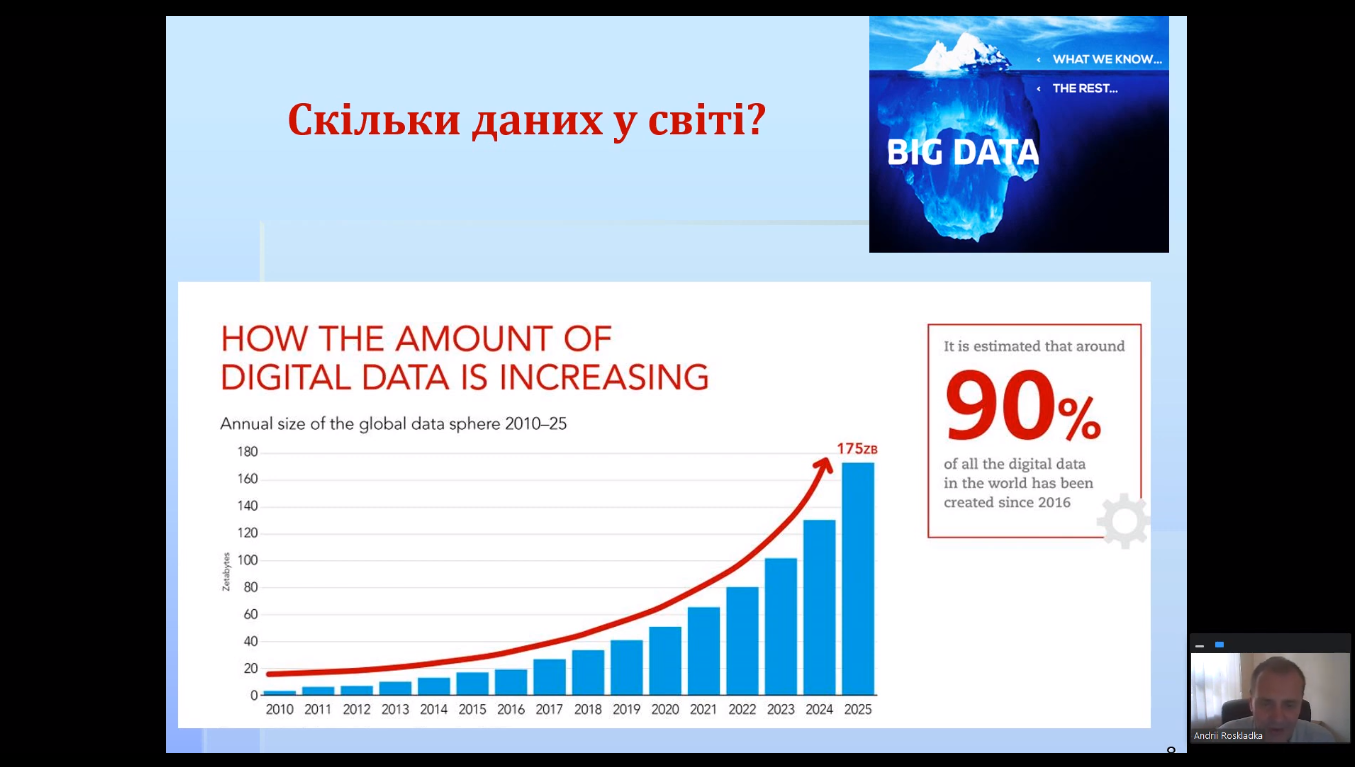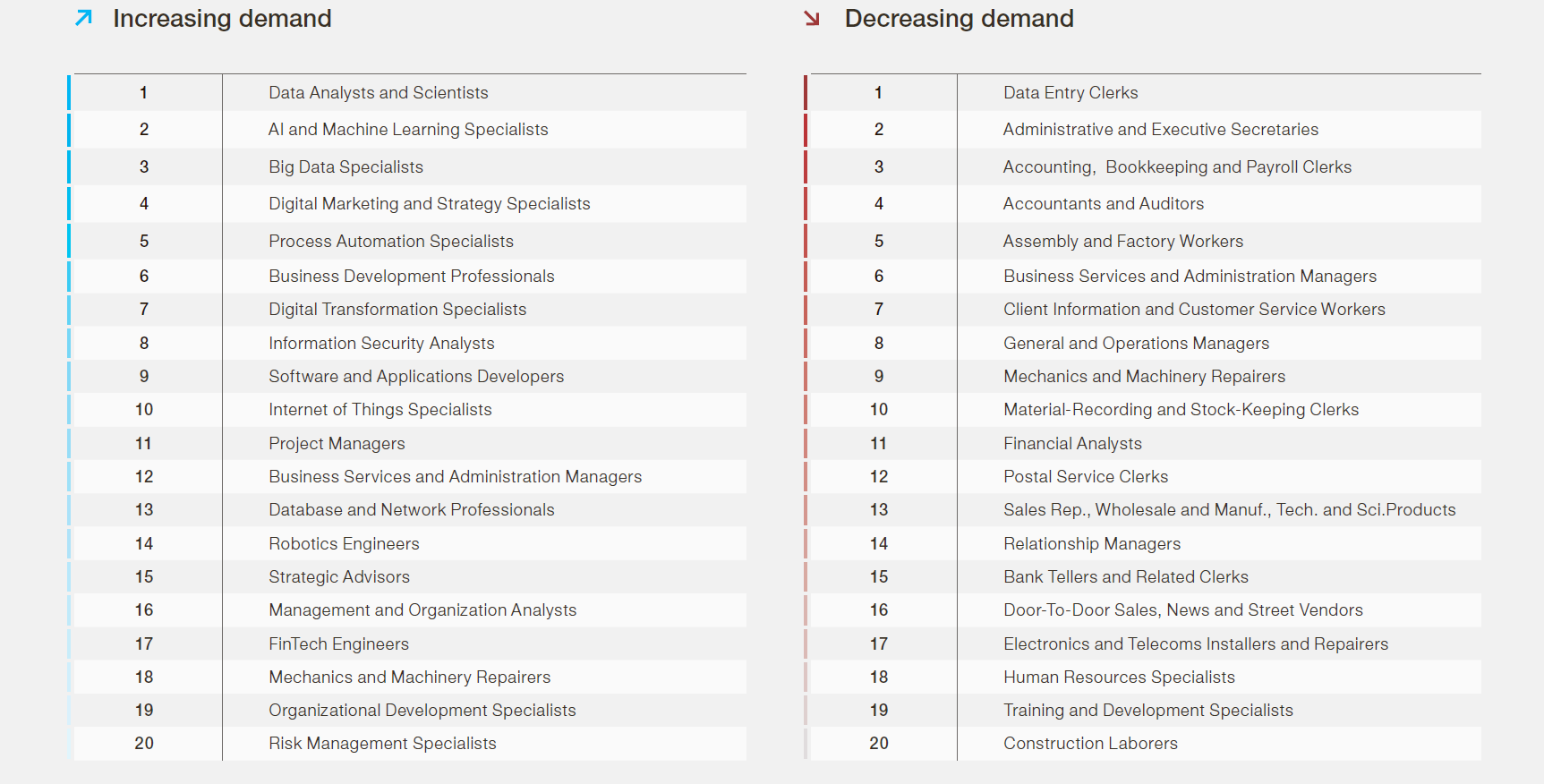Main page
of Digital Economy and System Analysis
Department of Digital Economy and System Analysis
trains professionals in Ukrainian- and English-taught educational programmes:
 |
 |
 |
|
"Digital
Economy" Ukrainian |
"Information
Technologies and Business Analytics |
 |
 |
|
"Digital
Economy" English |
"Information
Technologies and Business
Analytics |
Our future students, let's change the world together with our Digital Economy, Data Science, Computer&Math Modeling educational programmes (click to see YouTube presentation (ukr))

The most attractive professions of the XXI century
One of the most important stages in the life of graduates has begun - the choice of a future profession. No one is able to make this important decision for you. This is your personal choice! We want you to pay attention to the professions behind the future and the development of the world as a whole in the vast number of different specialties and educational programmes.
|
The World Economic Forum has published a report on the importance of Data Science in the world economy. Real data on the need for Data Science Skills in all areas of human activity are given. To find out more, visit the World Economic Forum website or read the report itself. After that, submit the documents to us;) The latest World Economic Forum in its report singled out the professions in decline (and there are a lot of them!) and the professions rapidly gaining popularity, which will be leaders in job offers world business in 2025. |
 |
We are pleased to designate that the professions related to Digital Economics and Data Science rank first in the rankings of the second group of professions. Let us briefly describe to you our promising educational programmes used to train specialists at the Department of Digital Economy and System Analysis.
Subject area 051 "Economics", the educational programme "Digital Economy"
According to the Concept of Digital Economy and Society of Ukraine, the key direction of the world economy is digitalization as saturation of the physical world with electronic-digital devices, tools, systems, and electronic-communication exchange between them, which allows creating of integrated virtual and physical interaction space. The scale and pace of digital transformation should be the main characteristics of economic development.
Digital professionals have the expertise to create and develop digital infrastructures for the domestic and global economy: mobile telecommunications networks, digital television, IoT projects, computing infrastructure, virtualization and data storage, cybersecurity infrastructure, blockchain technologies, electronic payments and transactions, electronic transactions, and online interaction of business entities, public service infrastructure (e-government), life support infrastructure (medicine, education, public safety, transport, etc.), geographic information infrastructure, digital industrial infrastructure.
During their studies, Bachelor's and Master's degree students professionally study the fundamentals of the digital economy, namely the Internet of Things, blockchain technology, e-commerce, e-government, information and cyber security, smart technologies, mobile application development technology, etc.
Subject area 124 "System Analysis", the educational programme "Information Technologies and Business Analytics (Data Science)"
According to IBM, there are currently about 3 million job vacancies for professionals who are proficient in modern big data analysis technologies, and the Harvard Business Review has identified the data analyst as "the Sexiest Job of the 21st Century" Glassdoor, the most authoritative website with information about work, which annually publishes the 50 most relevant professions in the United States, holds the data analysis experts in the top 3 for the last six years in a row.
The amount of information in the world has reached enormous proportions. This is eloquently evidenced by the fact that 90% of the data acquired by mankind during its existence has been obtained in the last four years. Conventional software can no longer qualitatively process and analyze the data obtained, and this is the main task of a business analyst.
System analysis is the ability to see the whole picture of the world as well as in detail, trace the connections between objects, understand the causes and consequences of events that at first glance are not related, and transform the passive baggage of abstract data and knowledge for specific actions.
Data Science, Data Analytics, Data Mining, Business Intelligence, Artificial Intelligence, Neural Networks, Machine Learning, - these are the most relevant sections of modern data science, which filled training of specialists in the educational programme "Information Technology and Business Analytics (Data Science)". Professional data analysis changes the world of programming, business and even consumers as much as the invention of the steam engine or personal computer.
Thus, working with information is becoming a priority for any business worldwide. And in Ukraine, there is already an urgent need for talented analysts who can process large amounts of data to support artificial intelligence platforms.
Subject area 113 "Applied Mathematics", educational programme "Computer and Mathematical Modeling"
Subject area 113 "Applied Mathematics", educational programme "Computer and Mathematical Modeling" is aimed at training bachelors who are able to formulate and solve practical problems and complex scientific problems using fundamental and special applied methods of mathematical and computer sciences; develop mathematical models, perform mathematical and computer modeling using modern analytical, numerical and computer methods; create and operate appropriate high-tech software. The educational programme "Computer and Mathematical Modeling" includes a thorough fundamental and applied mathematical training, study of mathematical modeling methods and their implementation through software development, as well as computer modeling.
State University of Trade and Economics meets all modern requirements for the training of highly qualified specialists in the field of Digital Economy, Data Science, and Computer and Mathematical Modeling. Currently, the Department of Digital Economy and System Analysis has opened new computer labs - "Digital Economy Lab" and "Business Analytics Lab", which are equipped with powerful computers and special software.
Since 2022, the University has opened English-taught Master's programmes "Digital Economy" and "Information technologies and business analytics (Data Science)".
Training of specialists in the digital economy, business analytics, and computer and mathematical modelling at the Department is carried out by the experienced doctors and candidates of economic, technical, and physico-mathematical sciences, who are professionally engaged in data modeling and analysis. Three professors of the Department have the certificates of international level instructors "Data Science Instructor Bootcamp", issued by IBM to give the right to train and certify data analysis specialists.
I wish you a successful career choice and look forward to meeting you as our Bachelor's and Master's students in the «Digital Economy», «Information Technology and Business Analytics (Data Science)», and «Computer and Mathematical Modeling» programmes.
Sincerely,
Andrii Roskladka
Head of the Department of Digital Economy and System Analysis,
State University of Trade and Economics, Doctor of Economics,
Professor
| Main professional training courses | |
| Educational Programme "Digital Economy" | Educational programme "Information Technologies and Business Analytics (Data Science)" |
|
Information and computer courses:
Economic and mathematical courses:
Economic courses:
|
Information and computer courses:
Mathematical courses:
Courses of modeling and analytics:
|
| Employment
prospects Higher education in the subject areas of digital economy and information systems and business intelligence allows a specialist to master the following professions: |
|
| Educational Programme "Digital Economy" | Educational programme "Information Technologies and Business Analytics (Data Science)" |
|
|
| Read more about the Educational Programme "Digital Economy" | Read more about the Educational Programme "Information Technologies and Business Analytics (Data Science)" |




